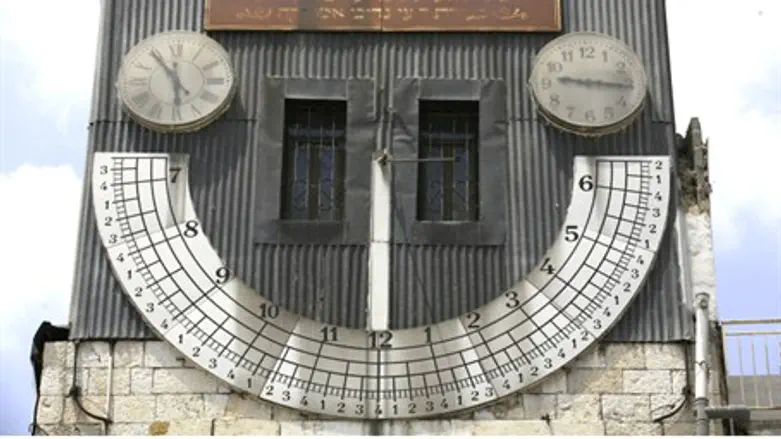
Scant dozens of people trickled into Rabin Square in Tel Aviv early Saturday evening to protest the changing of the clock in Israel Sunday morning. The crowd, made up mostly of Meretz supporters and radical secularists, demanded that summer time (daylight savings time) be extended for at least another month and a half, similar to current practice in the U.S. and much of Europe. At its height, the crowd numbered about 200.
MK Ronit Tirosh, who has proposed a law in the Knesset to extend summer time, said that “Interior Minister Eli Yishai is continuing to make promises that the extension of summer time will be legislated during the coming Knesset session, but in reality he knows that the only law that will be passed will be the one to disband the Knesset. Meanwhile, he is forcing Israelis to lose hours of light and waste electricity. Israel, he has again proven, is a 'dark' country.”
Tirosh was referring not only to the earlier arrival of night that winter (standard) time entails, but to the notion that Hareidi parties like Shas, which Yishai heads, have conspired for decades to prevent later implementation of winter time. After summer time was implemented in Israel several decades ago, several Hareidi groups expressed their opposition because they felt that the later departure of Shabbat in the summer would entail greater violations of the Sabbath. A status quo situation was eventually worked out whereby winter time would be implemented several days before Yom Kippur, and end at the beginning of April, generally before Passover.
Critics of the arrangement say that while those who thought the Yom Kippur fast was “shorter” because it ended an hour earlier on the winter clock – as opposed to the extension of the fast by an hour – were just fooling themselves, because the fast lasted for the same 25 hour period. Those who fast respond that while that may be true arithmetically, the fast ends earlier in the evening on winter time, making the time spent fasting during the day shorter, while its adding an hour to Yom Kippur eve is not noticeable.
While secularists attribute the winter/summer clock issue to religious extremism, polls show that many in the religious community would not mind extending summer time, especially during vacations, when many families take trips and are forced to return home earlier than they would wish because of the darkness. On the other hand, the Yom Kippur fast is an easier fast on winter time, while the Passover seder and the evening Sabbath meals, which cannot begin until dark, are much harder on children now that Israel is already on summer time. Some religious families usher in the Sabbath an hour earlier than regular candle-lighted time in the summer for that reason.
In any event, clocks in Israel will be turned back an hour at 2:00 AM Sunday morning, when the time will once again become 1:00 AM. Winter time will extend for 177 days, through April 1, 2013.